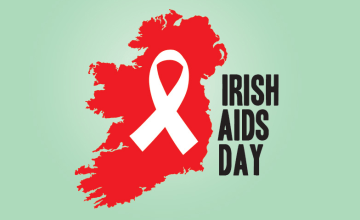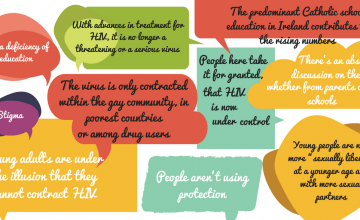
Read our 2024 annual report

Knowledge Hub
Ten people diagnosed with HIV in Ireland every week

Ahead of Irish Aids Day today, we canvassed students in UCD and members of staff in Concern about why they think HIV infection rates are still so shockingly high in Ireland.
More than 500 people were diagnosed with HIV in Ireland during 2016 (HPSC statistics). Why is it that in 2017 in Ireland ten people are newly diagnosed with HIV every week?
We did a random vox pop in UCD, and here in the Concern offices in Dublin, asking people what people thought.
Why is HIV so rampant in Ireland – our vox pop
When I was at college, a lot of young people thought that if they were on the pill or using an IUD, that they were protected.

People still think that HIV is exclusively in the homosexual community, or only in Africa, and we don’t think it happens to us here in Ireland.
There seemed to be unanimous agreement among the people we spoke to that low HIV awareness and a lack of sexual education were key underlying problems.
So what do we do?
“Education, Education, Education, and from a young age,” said one person, and this was a repeated theme with people we spoke to. “Education, that’s really the key, isn’t it? Making sure people are informed and taking the right precautions.”
We need something clever, and something that isn’t wasting money; like an ad on a billboard, that’s not going to help anyone. It has to be within families, and schools and communities.
Other people talked about the importance of parents and sex education in prevention. The availability of contraception was also quoted: “condoms should be more freely available meaning that you don’t have to ask someone to hand them to you”. Some also suggested that PrEP should be available in Ireland; and prevailing stigma didn’t help, although said another person: “I think that stigma has lessened with the likes of Panti speaking out”.
There is still an underbelly of shame here in Ireland, even with girls asking doctors for the pill or for protection.
Know your epidemic, know your response
More than a decade ago, Professor Peter Piot, then Executive Director of UNAIDS said, “know your epidemic”.
Led by UNAIDS, “Know your epidemic, know your response” became a rallying cry for an intensified focus on HIV prevention, by identifying the behaviours and social conditions that are most associated with HIV transmission, risk and vulnerability.
This can provide the basis for countries to “know your response” and to “tailor your prevention plans” to meet the needs of the populations with highest rates and highest risks of HIV.
HIV is technically 100% preventable, and HIV and AIDS-related illnesses are increasingly treatable. Access to anti-retroviral treatment (ARVs) in Ireland is thankfully guaranteed.
Inequalities in access to treatment
Over two million people globally were newly diagnosed with HIV in 2015. This is almost 40,000 new HIV infections transmitted globally per week.
The main drivers of HIV transmission locally and globally continue to be a lack of education, poverty, inequality (especially economic and gender), injustice in terms of access to prevention and treatment services, violence, and stigma and discrimination.
Key affected populations and the extreme poor are being left behind in Africa and Asia.
Access to ARVs is still sadly low among poorest populations in areas where Concern is working. In other words, many of the poorest will die as a result of this.
Irish Aid, Concern Worldwide, the Global Fund and all Dóchas members all have a responsibility to do more within our overseas aid programmes with local partners to end AIDS. Ireland can lead by example, acting optimally on HIV prevention and treatment here and supporting through the Irish Aid programme globally. Ireland remains a major contributor to the Global Fund to fight AIDS, TB and Malaria.
HIV in Ireland
And in Ireland? Looking at the HPSC data for 2016 here in Ireland, we can ask:
- Among whom, how, where did the last 100 HIV infections occur in Ireland?
- Among whom, how, where will the next 100 HIV infections occur in Ireland?
- How can we best prevent at risk people from becoming infected with HIV?
Based on the available data, it is clear that we need to better engage with young adults, gay men / men who have sex with men (MSM), heterosexual people, intra-venous drug users and with people who contracted HIV here in Ireland and with those who contacted HIV abroad. We need to support everyone to test for HIV at a younger age, and routinely.
As suggested from the vox pop above, we need to take advice and plan HIV prevention responses with people living with HIV (PLHIV) diagnosed here in Ireland, and with most affected population groups. They are probably best placed to speak out, educate and “break the silence” aiming to stop the spread of HIV in this country and internationally.
HIV remains incurable, a burden for a person living with HIV, like any chronic illness and it come with a personal, social and economic and health costs. Ten newly diagnosed HIV infections in Ireland a week is not acceptable when we know how to prevent it.
As we mark Irish AIDS Day today, let’s all do more to support education for HIV prevention within our families, our school and our communities.
More information
If you require additional information or assistance, or just to talk:
- HSE Drugs/HIV Helpline Freephone: 1800 459 459
- HIV Services Directory of HIV services throughout Ireland: https://www.hivireland.ie/


